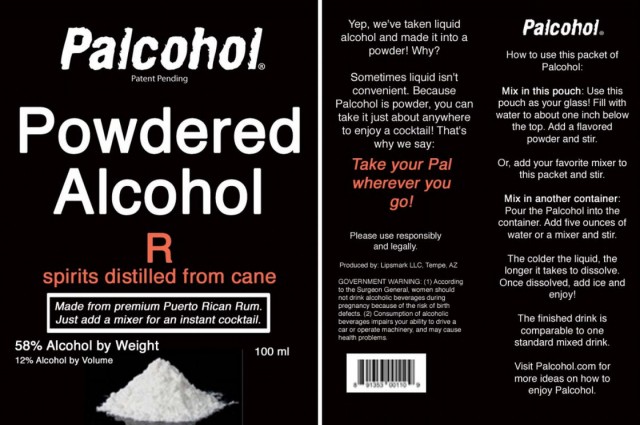
A new alcohol powder is set to be released in the US come fall. Branded "Palcohol," the powder is designed to be added to water by the ounce, resulting in mixed drinks like margaritas and kamikazes, or straight vodka.
News of the brand first started circulating on Monday, when outlets discovered Palcohol's site, following its label approval by the Alcohol and Tobacco Tax and Trade Bureau. The labels were intended for 100-ml packets of powder that were 44-51 percent alcohol by weight (56-65 percent by volume); they instructed would-be imbibers to "just add water." Palcohol is meant to be more portable than alcohol's usual forms, which often involve a lot of glass or aluminum and water.
Palcohol will purportedly come in six versions: two straight spirits (vodka and Puerto Rican rum) and four cocktails (cosmopolitan, mojito, lemon drop, and "powderita"). To the inevitable question of "can you snort it?" Palcohol answers "don't do it! It is not a responsible or smart way to use the product," as if that has ever stopped anyone who snorts things from snorting anything.
Palcohol's predecessors
While Palcohol's possible, eventual existence is throwing everyone for a loop, it appears powdered alcohol has existed, at least in theory, on the fringes of the substance world for a while. The first US patent (3,436,224) for powdered alcohol was filed in 1964 by Harold E. Bode of Cleveland, Ohio, and granted in 1969. It describes a number of water-soluble substances for creating alcoholic beverages.
According to the patent, the process involved dehydrating a "starch-based polysaccharide material until the moisture con ten [sic] is less than 0.75%," cooling that material to a "food flavor vapor-sorbing temperature." The next step is "exposing the said dehydrated material to anhydrous ethanol," and, if desired, to "one or more anhydrous food/beverage flavors from the group comprising carbon dioxide, and aroma volatiles from cereals, fruits or vegetables." In short, dehydrate some carbs, cool them, expose them to anhydrous ethanol and, if you want, add some flavorings, and voila—alcohol in Kool-Aid form.
The resulting products would be dry and reconstitutable "beverage powders." The patent also specifically mentions "beer beverage powder," one with "anhydrous malt syrup solids," and "volatile beer flavorings and aromas."
But apparently, this approach didn't work brilliantly. Gen Foods Corp followed this patent with its own, filed in 1972 and granted in 1974, dissed the product in the previous patent, saying it produced a cloudy and "undesirably sweet" beverage with "relatively low levels of alcohol fixation" that needed "excessive amounts of carbohydrate fixative." The product was also described as too viscous with poor appearance and texture.
Instead, Gen Foods Corp proposed a flowable powder using dextrins as the carbohydrate, which could produce a substance that was up to 60 percent ethanol by weight. When mixed with water, the powder would produce a "low-viscosity, clear, colorless" alcohol. Gen Foods Corp's patent also cites a British patent, GB1138124, which is not available online.
Alcoholic powders never quite made it to market in the US, even though the patents in question should have expired at least 20 years ago, throwing the market open to anyone. In 2008, rumors circulated that a company named Pulver Spirits would release an alcoholic powder, but all that remains of the company are third-party mentions on various forums and blogs; its site is now defunct.
Europe, on the other hand, has approached alcoholic powder slightly more directly. One company, Subyou, appears to have once sold powdered alcohol (circa 2005) online. Now, per the company's site, it sells powdered energy drinks. A group of Dutch students scandalized the media in 2007 with Booz2Go, 20-gram packets of powder that produced a three-percent alcohol beverage when mixed with water. One of the students told Reuters that the powder form of the product would allow them to sell to underage kids (the legal drinking age in the Netherlands was 16 at the time, but is now 18 as of January 2014).
The most recent example of alcohol powder is not instant, but can be added to juice for a fast-tracked brewing cycle that makes a beverage of 14 percent alcohol in 48 hours. The product, called Spike Your Juice, was originally sold in August on firebox.com; originally, it was only sold to the EU, but is now available on Amazon.
Inebriation in powder form, still to come
This brings us to Palcohol, which, upon its flurry of media attention, had its TTB approval revoked. According to the company's site, the problem is not Palcohol's questionable product, but rather "a discrepancy on our fill level, how much powder is in the bag." The TTB itself would not further clarify on the revocation, according to CNN.
Palcohol expects to start shipping its product in the fall, noting that "no samples will be released ahead of time."
reader comments
135